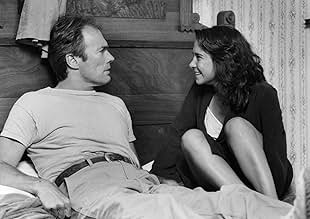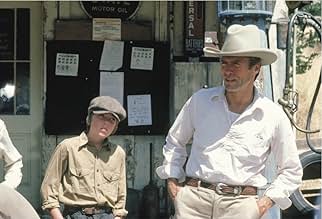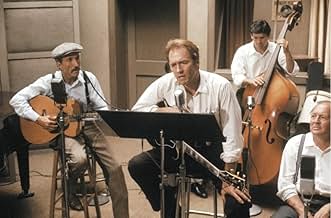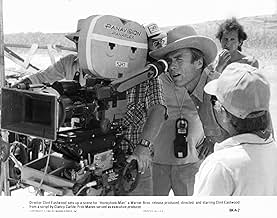A boy with a music talent goes on a journey with his uncle for a stage concert.A boy with a music talent goes on a journey with his uncle for a stage concert.A boy with a music talent goes on a journey with his uncle for a stage concert.
- Awards
- 1 nomination total
- Director
- Writer
- All cast & crew
- Production, box office & more at IMDbPro
6.610K
1
2
3
4
5
6
7
8
9
10
Featured reviews
Anti hero.
It took a lot of nerve in the early eighties,in the days of Rocky,Indiana Jones and "fame" to portray such a human wreck.Eastwood's character recalls Hank Williams,one of the few country singers whose songs experimented tragedy ("I'll never get out of this world alive"). The difference lies in the fact that the singer here will remain an obscure artist.
A road movie,it features an interesting boy character who learns the harsh realities of life.In the short space of a couple of days,he will have experimented love (first in a brothel,then probably later with the girl they met along the road) and death (he'll have to cope with a burial).The young female "singer" they -reluctantly-take with them provides the movie with the comic relief it does need:you should hear her sing "My bonnie" in a shrill voice.
The ballads Eastwood sings are moving and tuneful(I don't know if he is dubbed for them,but anyway it's made with taste and respect for the audience).The audition is the highlight of the movie,Eastwood seems to sing as if it were a matter of life and death(and it is anyway).The actor/director avoids pathos and melodrama.Once again,it was a very risky move to play such a character at a time when success story was the golden rule.The movie was bound to be a flop,but it deserves to be restored to favor now.
A road movie,it features an interesting boy character who learns the harsh realities of life.In the short space of a couple of days,he will have experimented love (first in a brothel,then probably later with the girl they met along the road) and death (he'll have to cope with a burial).The young female "singer" they -reluctantly-take with them provides the movie with the comic relief it does need:you should hear her sing "My bonnie" in a shrill voice.
The ballads Eastwood sings are moving and tuneful(I don't know if he is dubbed for them,but anyway it's made with taste and respect for the audience).The audition is the highlight of the movie,Eastwood seems to sing as if it were a matter of life and death(and it is anyway).The actor/director avoids pathos and melodrama.Once again,it was a very risky move to play such a character at a time when success story was the golden rule.The movie was bound to be a flop,but it deserves to be restored to favor now.
high praise for Clint and Kyle
As with most movies i prefer to read professional critics after viewing,although i do sometimes read them first. Frankly as a retired sound man i do not allow critics to influence me either way. This movie with (my first viewing of a Clint family member)Kyle succeeded in roller coasting emotion from humour to unsentimental portrayals of all the cast. I looked out for Marty Robbins, whose name was referred to as the one (albeit brief) sole touching moment in the film. It was undoubtedly a touching moment, but certainly not the only one. The entire theme was skillfully intertwined with some really great songs and lyrics. This is another DVD I will add to my collection. A movie to watch, and even learn from, as to how humanity can be humble and unpretentious with subtlety, warmth and understated aggression. Clint is understandably angry, and we feel real sympathy for his place in the world he inhabits.
Ironic that one of Eastwood's least known films might be one of his most personal...
A little farm somewhere in Oklahoma that can be mistaken for a Western homestead. But then a red convertible comes toward as uninvited a guest as the dust storm. Then from the worn-out overalls and the whole sandy texture, we can tell this is the Great Depression. So just before the story starts, a series of vignettes popped in my mind: families, nostalgia, America, country music, blues, road movies...I knew what to expect.
The car stops before it hurts someone (except for the driver and an ill-placed windmill), the driver isn't dead but "dead drunk", it's the family's uncle from Mama's side. He doesn't know it yet but the life of fourteen-year old Whit (Kyle Eastwood) is taking a new turn very soon. That boy spent his life staring at the emptiness of the Oklahoman plains while sitting on the house steps, so he welcomes the visitor as good news and what is hidden in the car's trunk is more than promising: it's a guitar, smooth and shiny.
As Red Stovall, Clint Eastwood makes an interesting variation on the 'cool uncle' figure, the one who travels a lot, tells interesting stories and always bring items that cut through the daily banality. Eastwood doesn't even make him unlikable, just a bit gruff, but this is a man who likes music and can only appreciate that a kid likes it. Whit's father (Matt Clark) is a frustrated farmer with the look of someone who kept eating the sour grapes of wrath, Red can see that this is no inspiring figure for a kid at the verge of adulthood while Whit admires his detachment and his badass stetson. The bond is tacit but immediate, Whit cleans his uncle's car so good one could see his face there, he makes it ready for a new start as if he felt he would be part of it.
Road movies and Great Depressions form an inevitable narrative pairing, that was the time of John Steinbeck and famers emigrating, the time Bonnie and Clyde filled the headlines while emptying small town banks, the time artists translated their ordeals into songs that built up to country music, and that's Red's dream: a stage concert in the Grand Ole Opry in Nashville. The mother (Verma Bloom) is worried about her brother's suspect coughs and accepts to have his son following him. The third passenger is Grandpa (John McIntre) who wants to go back to Tennessee, being the one instance of a man moving toward a brighter death.
As usual, Eastwood plays a man with a secret past, once we suspect triggered his alcoholism and choice for celibacy, a broken romance, a bad choice, a fear of success, who knows? There's obviously something buried in that soul that the gentle poetry of country music can dig out one shovelful at once. Like I said in many reviews, country music is all about telling stories. The film's gone for one hour when Red unveils his secrets and once they come, we're not even surprised for they were already hinted in the songs he played in shabby motels, musical clubs and honkytonks. The songs told his story allowing the rest to be totally devoted to a tender picturesque uncle-and-nephew journey.
And so we see them traveling, making halts in colorful little towns, fixing their cars and visiting whorehouses to pursue the initiation of little Whit, he breaks a promise by drinking some bootleg whisky, he has his first dizzying inhalations but nevertheless remains a good kid, being as essential a driver and assistant to Red as Red is a mentor. What they have in common than is that they're aware of their limitations but are willing to take chances, still better than working in a plantation. They're right on the long term because country music doesn't nourish people as folks do but we do remember folks through country music. The audition is Red's ticket for immortality.
Now, "The Honkytonk Man" is one of these low-key Eastwood movies that only invite you to take each moment as it comes and see where it's leading up to. You have a few chuckles when they steal hens and get arrested, you're in awe of the grandpa recalling his memories of the Oklahoma rush, September 16 1893 I remember it, and you just enjoy the music. And what do you know, at the end you realize that you've enjoyed a little gem, it had a story, it had character development and once again with Clint Eastwood, even the 'minor' offerings have major things to say. This time, it's about the roots of America, the art form it originated without any European inspiration, the best that could come from the most difficult times.
The atmosphere of the era is well-restored, there are some cameos from real artists and overall, the material adapted from Clancy Carlile's novel doesn't go for the big dramatic twist. Just when you expect a deadly confrontation with a shady debtor might end bad, it's played for laughs and introduces a plucky wannabe musician named Marlene (Alexa Kenin) who also wants to make it big in Nashville, she's not a love interest, not a sidekick, but just a girl eager to get one chance to change her life, she's as willing as the others. I was really impressed by her comedic potential, making Kyle Eastwood a little bland in comparison. It's quite sad the actress passed away shortly after the film.
I don't use "low-key" as a synonym of "unpretentious", Clint Eastwood is a child of the Great Depression, if he wasn't exactly from a poverty-stricken family, he grew up with the spectacle of Okies coming to pick oranges or cotton in California and listening to radio and country music. I'm no musical expert but I could feel the passion in his songs, and from the simple but poignant way he tells his story, you can tell Eastwood had it in him. How ironic that one of his lesser known film might be his most personal.
The car stops before it hurts someone (except for the driver and an ill-placed windmill), the driver isn't dead but "dead drunk", it's the family's uncle from Mama's side. He doesn't know it yet but the life of fourteen-year old Whit (Kyle Eastwood) is taking a new turn very soon. That boy spent his life staring at the emptiness of the Oklahoman plains while sitting on the house steps, so he welcomes the visitor as good news and what is hidden in the car's trunk is more than promising: it's a guitar, smooth and shiny.
As Red Stovall, Clint Eastwood makes an interesting variation on the 'cool uncle' figure, the one who travels a lot, tells interesting stories and always bring items that cut through the daily banality. Eastwood doesn't even make him unlikable, just a bit gruff, but this is a man who likes music and can only appreciate that a kid likes it. Whit's father (Matt Clark) is a frustrated farmer with the look of someone who kept eating the sour grapes of wrath, Red can see that this is no inspiring figure for a kid at the verge of adulthood while Whit admires his detachment and his badass stetson. The bond is tacit but immediate, Whit cleans his uncle's car so good one could see his face there, he makes it ready for a new start as if he felt he would be part of it.
Road movies and Great Depressions form an inevitable narrative pairing, that was the time of John Steinbeck and famers emigrating, the time Bonnie and Clyde filled the headlines while emptying small town banks, the time artists translated their ordeals into songs that built up to country music, and that's Red's dream: a stage concert in the Grand Ole Opry in Nashville. The mother (Verma Bloom) is worried about her brother's suspect coughs and accepts to have his son following him. The third passenger is Grandpa (John McIntre) who wants to go back to Tennessee, being the one instance of a man moving toward a brighter death.
As usual, Eastwood plays a man with a secret past, once we suspect triggered his alcoholism and choice for celibacy, a broken romance, a bad choice, a fear of success, who knows? There's obviously something buried in that soul that the gentle poetry of country music can dig out one shovelful at once. Like I said in many reviews, country music is all about telling stories. The film's gone for one hour when Red unveils his secrets and once they come, we're not even surprised for they were already hinted in the songs he played in shabby motels, musical clubs and honkytonks. The songs told his story allowing the rest to be totally devoted to a tender picturesque uncle-and-nephew journey.
And so we see them traveling, making halts in colorful little towns, fixing their cars and visiting whorehouses to pursue the initiation of little Whit, he breaks a promise by drinking some bootleg whisky, he has his first dizzying inhalations but nevertheless remains a good kid, being as essential a driver and assistant to Red as Red is a mentor. What they have in common than is that they're aware of their limitations but are willing to take chances, still better than working in a plantation. They're right on the long term because country music doesn't nourish people as folks do but we do remember folks through country music. The audition is Red's ticket for immortality.
Now, "The Honkytonk Man" is one of these low-key Eastwood movies that only invite you to take each moment as it comes and see where it's leading up to. You have a few chuckles when they steal hens and get arrested, you're in awe of the grandpa recalling his memories of the Oklahoma rush, September 16 1893 I remember it, and you just enjoy the music. And what do you know, at the end you realize that you've enjoyed a little gem, it had a story, it had character development and once again with Clint Eastwood, even the 'minor' offerings have major things to say. This time, it's about the roots of America, the art form it originated without any European inspiration, the best that could come from the most difficult times.
The atmosphere of the era is well-restored, there are some cameos from real artists and overall, the material adapted from Clancy Carlile's novel doesn't go for the big dramatic twist. Just when you expect a deadly confrontation with a shady debtor might end bad, it's played for laughs and introduces a plucky wannabe musician named Marlene (Alexa Kenin) who also wants to make it big in Nashville, she's not a love interest, not a sidekick, but just a girl eager to get one chance to change her life, she's as willing as the others. I was really impressed by her comedic potential, making Kyle Eastwood a little bland in comparison. It's quite sad the actress passed away shortly after the film.
I don't use "low-key" as a synonym of "unpretentious", Clint Eastwood is a child of the Great Depression, if he wasn't exactly from a poverty-stricken family, he grew up with the spectacle of Okies coming to pick oranges or cotton in California and listening to radio and country music. I'm no musical expert but I could feel the passion in his songs, and from the simple but poignant way he tells his story, you can tell Eastwood had it in him. How ironic that one of his lesser known film might be his most personal.
the story of many a musician
...and for that matter any human being.
Clint Eastwood's little masterpiece is filled with insights of human
nature and our dreams and how futile but nonetheless honorable
they are in most cases.
Watch out for many keys to understand low(er) class white Americans
and how music is one of the very best ways to bring them together
with, or at least closer to, African Americans. Without gospel, blues
and jazz - three styles developed by black people in the US during
the early 20th century - there would (arguably) be no country music and of
course no pop music (as it is today).
I am a musician and this little masterpiece certainly means a lot to
me and my colleagues all over the world.
This movie definitely is a metaphor of life and Clint Eastwood uses his second passion after cinema, music, as the
base but it contains so much more deep philosophy and homage
that I do not hesitate calling it a small masterpiece.
IMHO Honkytonk Man is for Clint Eastwood what Little Man Tate
(1991) is for Jodie Foster - only better, much better. Just think
about the fact that Clint went back (explained in a monologue) for
his skinny girl. After all he did love her.
It takes cojones to make a movie like that. Great work Mr.
Eastwood.
Clint Eastwood's little masterpiece is filled with insights of human
nature and our dreams and how futile but nonetheless honorable
they are in most cases.
Watch out for many keys to understand low(er) class white Americans
and how music is one of the very best ways to bring them together
with, or at least closer to, African Americans. Without gospel, blues
and jazz - three styles developed by black people in the US during
the early 20th century - there would (arguably) be no country music and of
course no pop music (as it is today).
I am a musician and this little masterpiece certainly means a lot to
me and my colleagues all over the world.
This movie definitely is a metaphor of life and Clint Eastwood uses his second passion after cinema, music, as the
base but it contains so much more deep philosophy and homage
that I do not hesitate calling it a small masterpiece.
IMHO Honkytonk Man is for Clint Eastwood what Little Man Tate
(1991) is for Jodie Foster - only better, much better. Just think
about the fact that Clint went back (explained in a monologue) for
his skinny girl. After all he did love her.
It takes cojones to make a movie like that. Great work Mr.
Eastwood.
Verismo!
The critics didn't like this film, but I beg to differ. Perhaps I'm naive and gullible, but to me it rings true in its local color and the coping of poor people in the Depression amidst the aspirations of young and old alike.
My father, a published author in a small way, once mused to me that if he were to write a novel, it would be about someone trying to come to terms with his own mediocrity. Such is the theme of this movie, and hardly typical a consideration it is in a time when the media bombard us coast to coast, for our adulation, with the glamorous images of a mere handful of individuals who happen to have landed vast fame and fortune. What does any of this have to do with most of us? On the one hand, we live day to day. On the other, a recurring dream whispers "maybe..."
Knowing that he is living on borrowed time, Red, humble and hand-to-mouth but respected more than he knows by a few somewhat more successful colleagues (and an unusually fallible and vulnerable character for Eastwood, which he plays well) is granted, in extremis, an apparent opportunity to reach for the stars. More down-to-earth, he is also fortuitously blessed/burdened with not just one but two young proteges: first his nephew, then also a girl at loose ends. Perhaps neither is particularly talented; nevertheless both have a claim on his attention which he reluctantly fulfills in his own unassuming way, while making no exalted pretenses as to their prospects. When on his deathbed he can do no more for them, he commends them to each other. "You take care of her, now" he rasps to Whit. "She's okay. Help her with her singing." While they may never reach celebrity, the texture of life can sustain them if they face it together.
As, dying and perhaps delirious, he gazes up into Marlene's face, he sees the "raw-boned Okie woman" he had loved for several years as a mistress, and whom he later had regretted leaving. She had borne a girl whom he had never met. Marlene was a fatherless waif of about the right age. Did he recognize at the last moment his long-lost daughter? It is a question which the film leaves hanging in the air. Does genealogy matter? In practical terms, that is what she became almost too late.
For my money, it's a raw-boned, American Okie "La Boheme."
My father, a published author in a small way, once mused to me that if he were to write a novel, it would be about someone trying to come to terms with his own mediocrity. Such is the theme of this movie, and hardly typical a consideration it is in a time when the media bombard us coast to coast, for our adulation, with the glamorous images of a mere handful of individuals who happen to have landed vast fame and fortune. What does any of this have to do with most of us? On the one hand, we live day to day. On the other, a recurring dream whispers "maybe..."
Knowing that he is living on borrowed time, Red, humble and hand-to-mouth but respected more than he knows by a few somewhat more successful colleagues (and an unusually fallible and vulnerable character for Eastwood, which he plays well) is granted, in extremis, an apparent opportunity to reach for the stars. More down-to-earth, he is also fortuitously blessed/burdened with not just one but two young proteges: first his nephew, then also a girl at loose ends. Perhaps neither is particularly talented; nevertheless both have a claim on his attention which he reluctantly fulfills in his own unassuming way, while making no exalted pretenses as to their prospects. When on his deathbed he can do no more for them, he commends them to each other. "You take care of her, now" he rasps to Whit. "She's okay. Help her with her singing." While they may never reach celebrity, the texture of life can sustain them if they face it together.
As, dying and perhaps delirious, he gazes up into Marlene's face, he sees the "raw-boned Okie woman" he had loved for several years as a mistress, and whom he later had regretted leaving. She had borne a girl whom he had never met. Marlene was a fatherless waif of about the right age. Did he recognize at the last moment his long-lost daughter? It is a question which the film leaves hanging in the air. Does genealogy matter? In practical terms, that is what she became almost too late.
For my money, it's a raw-boned, American Okie "La Boheme."
Did you know
- TriviaThe script originally called for Whit (Kyle Eastwood) to get high from smoking marijuana, but Clint Eastwood, who is very anti-drug, refused, even with Kyle using a prop cigarette. Eastwood finally relented to his son's character getting high from a contact buzz.
- GoofsRyman Auditorium is used as the setting for the Opry. This venue was not used until the 1940s, and the movie takes place in the 1930s.
- Alternate versionsABC edited 7 minutes from this film for its 1986 network television premiere.
- ConnectionsFeatured in At the Movies: Dueling Critics (1983)
- SoundtracksHonkytonk Man
Sung by Marty Robbins and Clint Eastwood
- How long is Honkytonk Man?Powered by Alexa
Details
- Release date
- Country of origin
- Language
- Also known as
- El aventurero de medianoche
- Filming locations
- Fallon, Nevada, USA(scene with bull)
- Production company
- See more company credits at IMDbPro
Box office
- Budget
- $2,000,000 (estimated)
- Gross US & Canada
- $4,484,991
- Opening weekend US & Canada
- $667,727
- Dec 19, 1982
- Gross worldwide
- $4,484,991
- Runtime
- 2h 2m(122 min)
- Sound mix
- Aspect ratio
- 1.85 : 1
Contribute to this page
Suggest an edit or add missing content









































